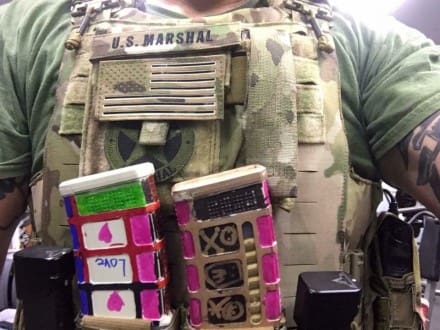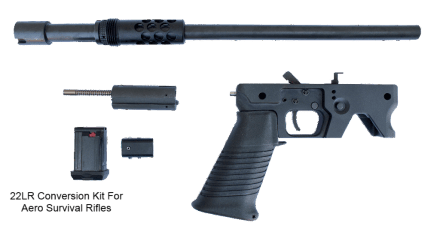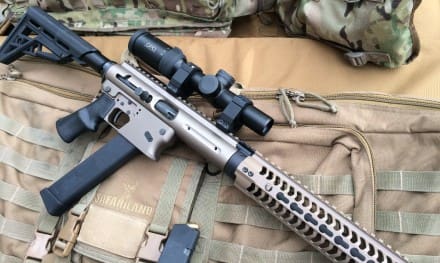
Industry giants team up to host 14-days of incredible giveaways online
Lakewood, WA, June 8, 2017 – Two of the industry’s biggest entities, Solider Systems Daily and Grey Ghost, have teamed up to host the Mother of All Giveaways – a 14-day giveaway contest where new winners will be selected every day, beginning June 12th and going through June 26th, to receive products ranging from 100 boxes of Grey Ghost Precision Match Grade Ammo and Grey Ghost Gear Minimalist Plate Carriers, to a SSD Custom, Limited Edition .300 Blackout rifle.
“This industry is saturated with options,” stated Grey Ghost President, Casey Ingels. “Realizing that our customers and followers have a multitude of avenues they could go for their news, firearms or soft good needs, we wanted to show our appreciation for those who chose and continue to choose both SSD and Grey Ghost. We’re hoping that this contest helps express our gratitude to those who have been so loyal to us, and to those who are new to the game.”
With total prize inventory estimated to value over $50,000 in firearms, soft goods and accessories, SSD and Grey Ghost have truly devised a giveaway of epic proportions! The 5 Grand Prizes that will be given away on the last days of the event, two pistols and three rifles, each custom Cerakoted and outfitted with aftermarket parts and furniture to be true one-of-a-kind builds are guaranteed to make any gun owner smile from ear to ear. The 1st Grand Prize is a Limited Edition .300 Blackout Rifle, complete with an SSD custom paint job, numerous Magpul upgrades, Grey Ghost Gear sling and case, and a stack of match grade ammo to complete the package. The 2nd and 3rd Grand Prize Packages are also unique rifles, Cerakote finished with different Grey Ghost Precision motifs.

As if those prizes weren’t incentive enough, the 4th and 5th Grand Prizes are custom GLOCK19 and GLOCK17 9mm pistols, each featuring the newly released Grey Ghost Precision Slides with custom Cerakoting, GGP match-grade barrels and CMC triggers. While there will only be one lucky winner for each Grand Prize, there are numerous prizes earlier throughout the giveaway that will make multiple winners very happy. A Grey Ghost Gear “Gunfighter” Kit is up for grabs, as well as 25 Apparition SBR Bags, 40 GGG Backpacks and 50 Grey Ghost Gear Minimalist Plate Carriers to be among the prizes.

“This has got to be one of the biggest giveaways our industry has ever seen,” stated Eric Graves, Founder of Soldier Systems Daily. “ We are pulling out all the stops, in an effort to show our loyal followers and customers just how much they mean to us.”
The giveaway begins on Monday, June 12th, with new prizes being announced each day via SSD and GG social media, as well as to the email subscribers.
Applicants enter by visiting www.soldiersystems.net and opting-in to the Giveaway Email List. There will be a pop-up form, as well as a pinned post on the homepage. Opt-in points will also be on www.greyghostgear.com and www.greyghostprecision.com. After opting-in through any of the three sites, applicants must then verify their entry via the confirmation email they receive.

Winner(s) will be randomly selected from a pool of participants who have opted-in to the Giveaway Email List via Soldier Systems’ website. The winner(s) of each prize will be announced the following day, along with the reveal of the new daily prize. So be sure to follow SSD and GG on social media each day to see if you are a winner, and if not, whats the next prize you still have a shot at winning. So if you’re hoping to win that SSD Custom rifle that will be the final Grand Prize, keep your eyes peeled for the winner to be announced June 26th.
Each winner will be notified via e-mail, as well as announced via SSD and GG Facebook pages, Instagram, and Twitter accounts. Participants need to only enter once, and they are instantly eligible for 14 chances to win a prize, and each day the pot only gets sweeter!
For official guidelines and terms of eligibility, click HERE.

About SSD
Soldier Systems Daily is the premier daily web publication covering the tactical industry. Government and Military Acquisition professionals, Industry leaders, and consumers alike rely on Soldier Systems Daily for its up-to-date reporting and in-depth analysis. No one else focuses on industry like Soldier Systems Daily and no one else publishes the sheer volume of information on a daily basis.
About GGP
Grey Ghost Precision produces weapon systems that are accurate, reliable, and attainable while ensuring that these platforms are ready for combat and will stand the rigors of hard use and perform with devastating results. The GGP team collectively has an extensive background in the military and in manufacturing. Rifle and pistol design specifications are directly influenced by a network of industry and shooting sports experts.
When customers include family and friends that use these rifles, pistols and accessories to protect themselves in dangerous environments, you are very serious about their safety and survival. GGP has zeroed in on quality and reliability to ensure that these platforms are ready for combat and will stand the rigors of hard use and perform with devastating results.
About GGG
Grey Ghost Gear provides the professional soldier and tactically minded civilian with the best, combat proven gear in the world. The gear designs have been continually combat tested and utilized in combat for over 10 years and is a direct result of the successes and failures in combat. The core principle of Grey Ghost’s research and development process is based on the lessons learned during real life combat operations. By constantly evolving gear to meet the needs of the modern Warfighter, the gear has become lighter, and form-fitting while offering the user more protection than other many other comparable manufacturers. GG Gear allows the user to move faster and fight harder than ever before; giving them the competitive edge they need to achieve their objective.
























































































































